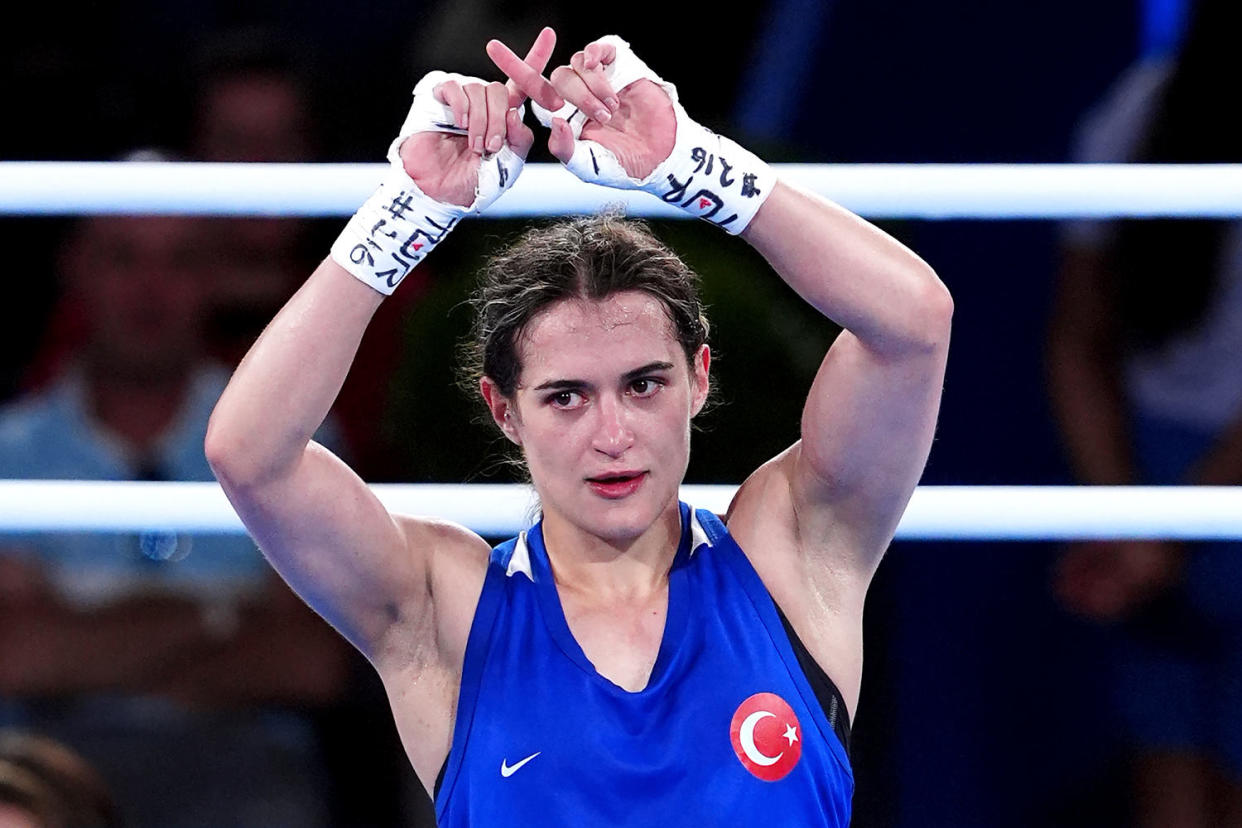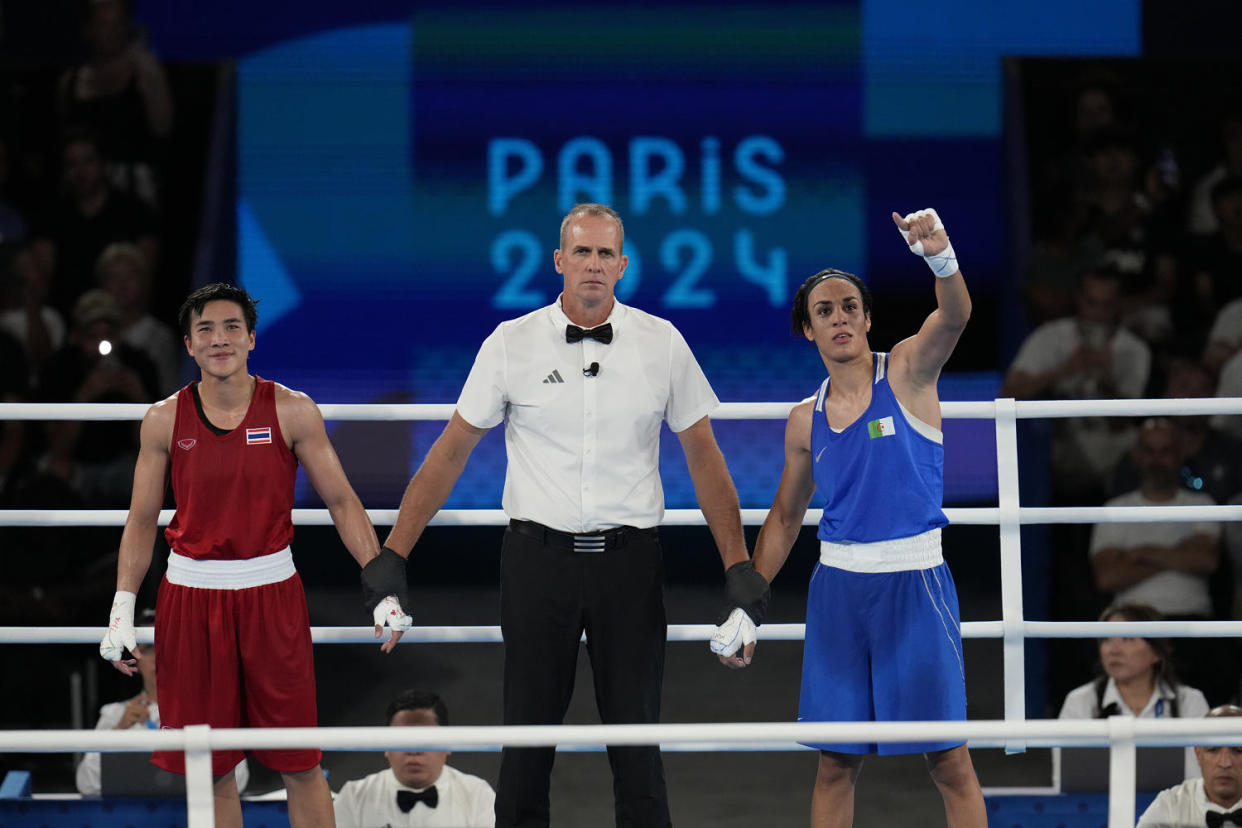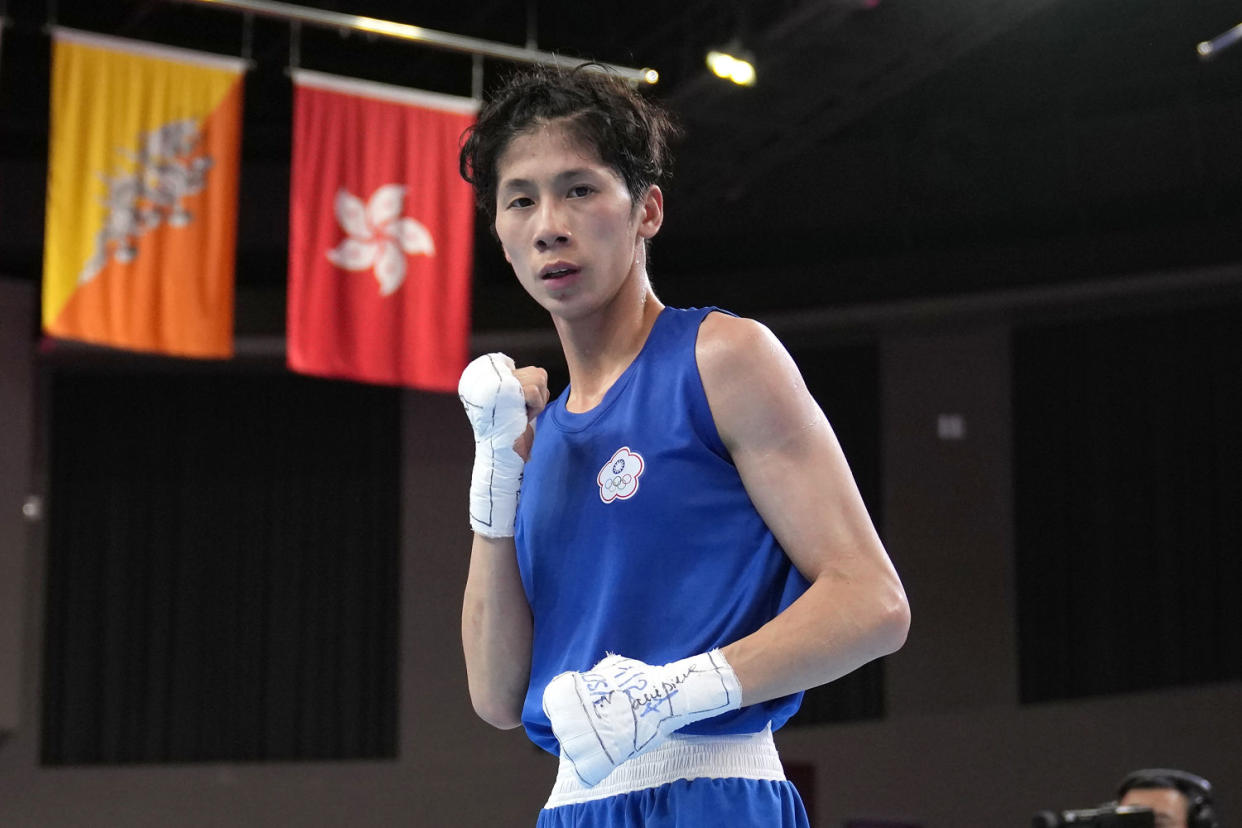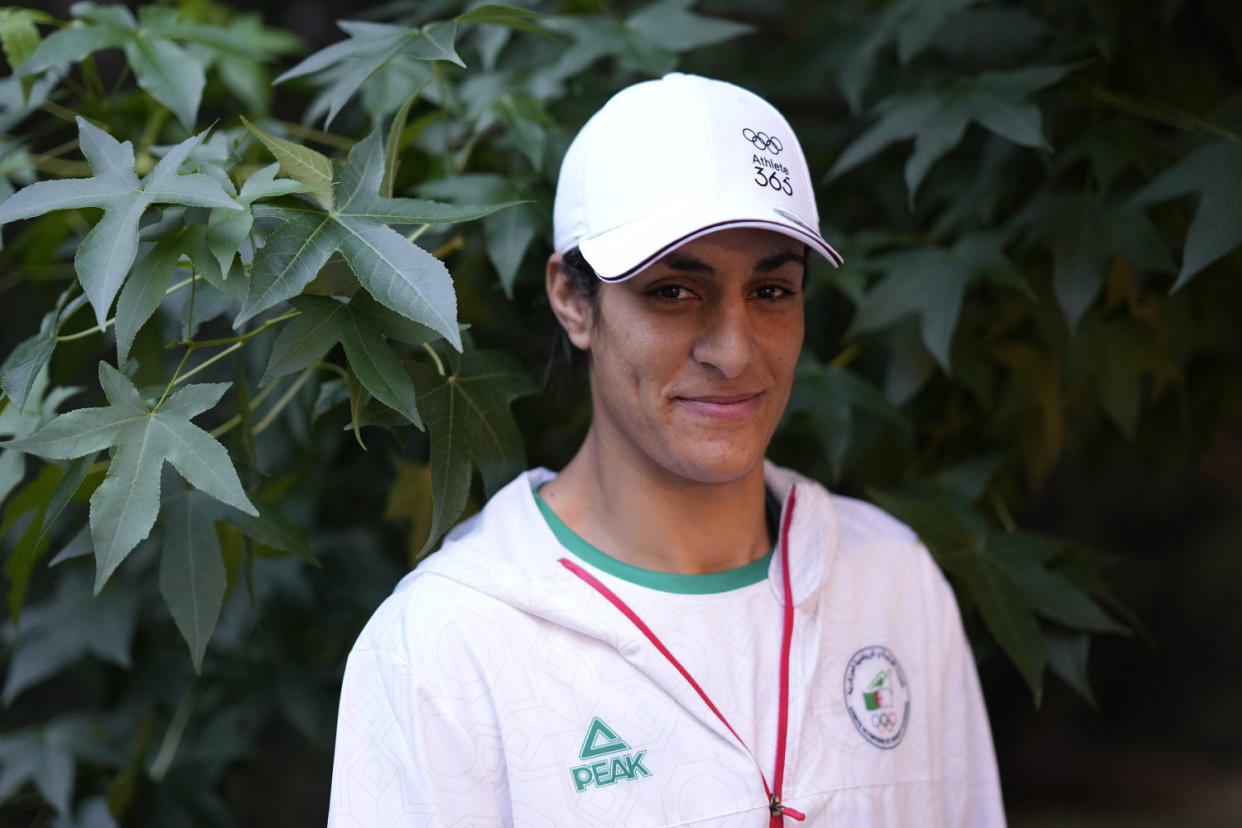Second boxer embroiled in Olympic gender controversy advances to gold medal final
PARIS — The second boxer at the center of a global debate over gender eligibility and fairness at the Paris Olympics won her semifinal match Wednesday, ascending to the featherweight gold medal bout.
Lin Yu-ting, representing Chinese Taipei, defeated Esra Yildiz Kahraman of Turkey by a unanimous decision, advancing to the final round of the women’s 57-kilogram competition Saturday.
Lin and another female Olympic boxer, Imane Khelif of Algeria, continue to face intense scrutiny and false accusations about their gender and eligibility to compete with women.
After she lost Wednesday night, Kahraman made the sign of an X with her fingers, which mirrored the actions of Bulgarian fighter Svetlana Staneva, who also lost to Lin earlier in the competition.
The Bulgarian Olympic Committee later confirmed that Staneva was boasting about having XX chromosomes in an attempt to mock Lin.
Representatives for the Turkish Olympic Committee could not immediately be reached for comment late Wednesday, but in a social media they posting declared Kahraman to be the real winner.

After she won Wednesday night, Lin made passing reference to the ongoing issue and said she's blocking it out by focusing on details of the next bout.
“Take it one step at a time, focus on each match, seize every opportunity in the ring and aim for victory until the end,” Lin told reporters.
All five judges had it 10-9 for Lin in all three rounds — though it was no cakewalk, as Kahraman, at times, appeared to be the more aggressive fighter.
But in the end, Kahraman couldn't solve Lin's height and superior technical ability.
The 5-foot-6 Kahraman threw several flurries of punches, bringing roars from the capacity Roland-Garros Stadium audience, but she couldn't get close enough to do damage against the 5-9 Lin.
Lin also appeared to slow down toward the end the third round and later told reporters she has been fighting a cold.
“The opponent is very strong and has pushed me hard, so the fatigue is normal," she said with a low, hoarse voice. "The opponent is a respectable one.”

Khelif also won her semifinal match, besting Thailand’s Janjaem Suwannapheng in the women’s 66-kilogram division bout Tuesday to advance to Friday’s gold medal match.
Khelif and Lin have competed for years in women’s events, including at the Tokyo Olympics in 2021, and there is no indication that they identify as transgender or intersex, the latter referring to people born with chromosomes or reproductive organs that don’t fit strictly into the male-female gender binary.
Questions surrounding their gender stemmed from a decision by the Russian-led International Boxing Association to disqualify them at last year’s Women’s World Boxing Championships in New Delhi.
At the time, the association’s president, Umar Kremlev — who is reportedly an acquaintance of Russian President Vladimir Putin — alleged in Russian state media that the two women failed an unspecified gender test showing that they have male chromosomes. The reports have resurfaced during the Olympics in Paris, where Russia has been banned from competing.
The International Olympic Committee has fiercely come to Khelif’s and Lin’s defense and repeatedly declared them eligible because of the genders listed on their passports. IOC officials have also noted that the IOC severed ties with the IBA last year because of financial and ethical impropriety.
IOC President Thomas Bach condemned the incendiary online commentary about the two boxers at a news conference Sunday, chalking it up to “hate speech.”
“We have two boxers who were born as women, who have been raised as women, who have a passport as a woman and who have competed for many years as women,” Bach said.
Lin has thanked her fans for their support in recent days. She reportedly took up boxing as a child to protect her mother from domestic violence.

Khelif has repeatedly spoken out against the allegations that she is not a cisgender woman since they began last year, and most recently told reporters Saturday: “I want to tell the entire world that I am a female.”
Khelif’s father has also insisted that his daughter is a woman whom he has raised as a girl. Speaking with Algerian broadcaster SNTV on Sunday night, Khelif pleaded for the public to “avoid bullying all athletes.”
The controversy has raised questions about the IBA’s legitimacy in recent days.
In 2019, the IOC suspended the IBA before it stopped recognizing it formally last year. A report commissioned by the IOC last year alleged that the IBA participated in years of financial and ethical corruption. USA Boxing, the sport’s U.S. governing body, also cut ties with the IBA last year, citing the “ongoing failures” of the association’s leadership.
IOC spokesperson Mark Adams called the IBA’s eligibility tests “flawed” and “not legitimate” at a news conference Sunday.
The IBA defended its decision to disqualify Lin and Khelif from the championships last year, saying in a statement last week that they also failed similar eligibility tests at its Women’s World Boxing Championships in Istanbul in 2022.
IBA officials didn’t take any action against Lin’s and Khelif’s allegedly failing the tests from 2022 and let them compete again last year. The timing of last year’s disqualifications, which came just days after Khelif beat an otherwise undefeated Russian boxer, has also been questioned.
A news conference the IBA hastily called in Paris on Monday shed little light on the gender-related allegations as Kremlev, its president, answered several questions with rambling remarks against the Olympics. Kremlev compared the Olympics to Sodom and Gomorrah, biblical cities destroyed because of their notorious sinfulness.

As false accusations about Khelif and Lin spread worldwide last week, prominent figures, including Elon Musk, “Harry Potter” author J.K. Rowling and former President Donald Trump, quickly weighed in.
“I will keep men out of women’s sports!” Trump wrote on his social media site, Truth Social, in all caps.
Some who initially criticized Khelif and Lin apologized as more information about them and the IBA’s legitimacy came to light. Among those who apologized was American influencer and pro boxer Logan Paul, who admitted on X last week that he “might be guilty of spreading misinformation.”
Others doubled down, including Rowling, who shared roughly a dozen critical posts about the Olympics to her 14 million X followers Wednesday, many of them referring to Khelif as “a male.”
Riley Gaines, a former college swimmer who has been an outspoken critic of transgender women’s participating in women’s sports, also referred to Khelif as “a male” and said, “Why have women’s sports at all if any mediocre male can compete in them?”
American middle-distance runner Nikki Hiltz, one of at least three nonbinary athletes participating in these Olympics, appeared to defend the boxers Tuesday after having advanced to the semifinals in the women’s 1,500-meter race.
“There’s a lot of ignorance and hate out there right now,” Hiltz wrote on Instagram. “For those who identify as nonbinary or trans and are doing cool things in the world (which is most likely all of you because all queer people are cool AF) remember you are magic and that it’s not the critic who counts.”
The Boston Globe had to issue a correction last week because it misidentified Khelif as transgender. In a statement on X, the newspaper said it “incorrectly” identified Khelif as trans and recognized “the magnitude of the mistake.”
Khelif will go up against Yang Liu of China for the gold medal in her division Friday.
Lin will face Poland’s Julia Szeremeta, who rallied to a split-decision victory in the other semifinal, in the gold medal bout Saturday at Roland-Garros.
Lin said she takes no opponent lightly.
“In the Olympics, making it to the top four means everyone is very strong," she said. "Some actions taken to win are understandable. I will reflect humbly and hope to do my best.”
Lin's fans back home in Taiwan had to stay up well past 3:30 a.m. to see her fight.
"There are a lot of supporters in Taiwan that I know, and it's late [in] Taiwan right now, and thanks for your support in front of the TV even though you need to go to work," Lin said. "Thanks to everyone."
David K. Li reported from Paris and Matt Lavietes and Jiachuan Wu from New York.
